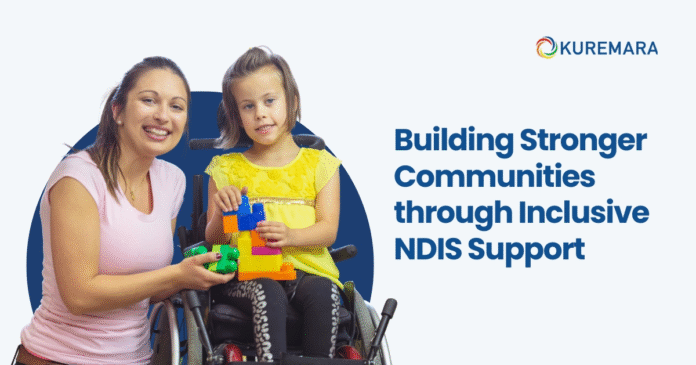The National Disability Insurance Scheme (NDIS) is changing lives Australia-wide, allowing individuals with disability to access the services, connected resources and community support they deserve. Local communities function better when inclusivity informs care delivery, and it is important for participants, their families and their carers to have an understanding of the different ways support is provided. This article considers how NDIS support is a pathway for providing autonomy and independence for individuals, and the role that providers play in making care accessible and individualised.
Understanding the NDIS Framework
The NDIS is designed to allow participants choice and control of the support they receive. The NDIS is participant-led and has a focus on longer term outcomes rather than short term care. The NDIS structure ensures people with disability can:
- Access appropriate levels of assistance for their daily living.
- Develop their independence through skill development.
- Engage with education, work, and community activities.
- Access supports or services that are tailored, and that change as participants’ needs change.
Flexibility is one of the biggest advantages of the NDIS, as it allows participants to plan for immediate needs and future aspirations.
Why Local Providers Are Important
Local providers have a crucial role in the NDIS. They are what create the local services that participants use. They understand the community where they are connected, the culture, the social aspects, and logistics.
Local providers matter because:
- Proximity: Taking a provider close to home reduces the participants’ travel issues.
- Context: They know the services and the opportunities related to local networks.
- Flexibility: Smaller providers may have more flexibility to change supports and respond to participant needs.
- Consistency: Familiarity with participants promotes trust and connection.
When choosing to use local providers, participants can benefit from a personal approach that combines professional expertise and connection to, and investment in the community.
Variety of Support Available
The NDIS provides services across many aspects of life, enabling participants to live independently, manage their health, and participate socially. Participants consistently access core supports such as:
- Daily Living Support: Assisting with personal activities, meal preparation or common household tasks.
- Therapeutic Supports: Allied health professionals (of which many allied health bodies can provide support) such as occupational therapy, physiotherapy or psychology.
- Community Participation: Facilitation for participants to participate in local events, activities and programs.
- Supported Independent Living (SIL): Ongoing support in shared accommodation for individuals that require daily assistance.
- Short Term Accommodation (STA): Respite care giving participants and their carers a break with safety and structure involving ongoing support
The diversity of support demonstrates the diversity of self-advocacy needs of our participants at different times in their lives.
The Benefits of NDIS Services
NDIS supports are far beyond giving an immediate solution to problems and challenges. They are about creating opportunities and enhancing quality of life. There are many dimensions of benefits that can be gleaned, including:
- Independence: Participants develop skills to engage and complete daily tasks with confidence.
- Well-Being: Participants access therapies and customized support, enhancing their physical and mental health, and well-being.
- Connection: Access to community engagement and group activities reduces isolation from participation in local and community connection.
- Choice: Participants have the ability to choose the services that are linked to their goals and aspirations.
- Future Planning: The scheme allows families to re-think the future within a long-term stable environment and plan for that long-term future with confidence.
For example, families accessing ndis sunshine coast services often mention how these supports not only build independence but also connect participants with outdoor and community opportunities unique to the region.
The Contributions of Families and Carers

Providers deliver the services, while families and carers are pivotal to the journey. Families and carers know the participant’s strengths, challenges, and preferences, and this information often informs how the supports can be designed. The collaboration between family, providers, and participants helps make the support as effective, but also as sustainable, as possible.
Practical Things To Think About When Choosing a Provider
Finding the right provider can sometimes feel like it is a lot to take on. Consider the following practical points of what to think about as a participant or family:
- Experience and Qualification: Does the provider have the experience in the specific supports you require?
- Flexibility: Are they willing to make changes to the support they provide as your goals change?
- Transparency: Do they provide clear and transparent information about cost, service agreements and expectations?
- Reputation: What do other participants and families say about the services they received?
- Values: Do their values align with your preferences with dignity, respect and inclusivity?
If you were able to find a provider that met each of these criteria, you have potentially found a valuable partner in the participant’s journey.
The Bigger Picture – Community Effects
NDIS services do not just support individuals, but whole communities. As we engage with greater inclusivity, connected communities become more vibrant, accepting and resilient. Strong NDIS networks can lead to, for example:
- Greater accessibility to infrastructure, including ramps and inclusive transport.
- Greater awareness about disability rights and inclusivity.
- Stronger proactive linkages between health, education and community sectors.
- Increased opportunities for employment or volunteering in the support services.
This ripple effect demonstrates how NDIS support is not only a benefit for the individual, but an asset for whole communities.
Regional Growth and Accessibility
In Australia, the demand for NDIS providers is on the rise as more and more participants are looking for services closer to where they live. For example, families considering ndis providers Toowoomba would prefer a locally based service that they could attend to after school has finished, that is grounded in professional care and community access. Accessibility of support doesn’t just apply to regional areas, as the demand in larger coastal cities is consistently rising as well. These examples illustrate the importance of location-based providers and their roles backfilling gaps in service delivery and giving all Australians the ability to engage with the scheme.
The Future
As the NDIS continues to develop by creating new policies, frameworks and service models to meet the changing needs of participants, what will always remain the same is the vision of a more inclusive Australia for everyone to have equal opportunities in life, including people living with a disability. The NDIS is a collective responsibility that includes all providers, participants and their communities as equal partners to create a more inclusive future.
Final Conclusion
The success of the NDIS (not just the design) is based on how well it is implemented at the next level of service, the local community. The local provider experience is essential in order for participants to build lives full of independence, connections and opportunities, in a fashion that is respectful, inclusive and flexible. As the demand in both metropolitan and regional contexts grow, the focus should always be on quality, choice and accessibility for people living with disability.


